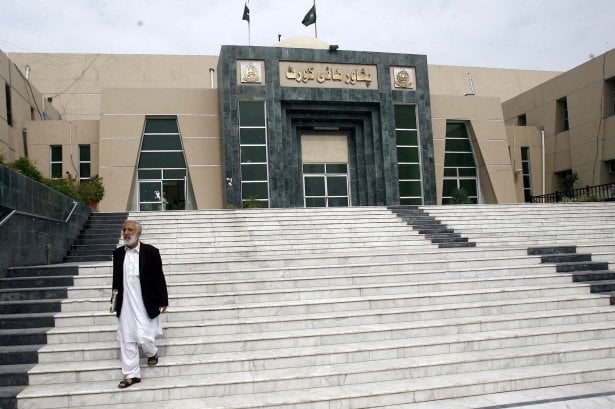
With no solution in sight, his lawyer has asked him to wait patiently.
At each hearing, 62-year-old Rahmatullah hopes for meaningful progress in the case but is disappointed with the customary adjournment owing to either the absence of lawyers or other legal hurdles which prevent the resolution of his case.
High court seeks reports on harassment allegations
“It seems very difficult to get a solution in the courts,” the sexagenarian told The Express Tribune.
“I think, I will not able to see the resolution of my case during my lifetime.” With a disposal rate of barely two per cent, there are more than 180,383 cases pending in Khyber-Pakhtunkhwa’s (K-P) 416 lower courts till June 2018, says the data provided to Express Tribune.
However, the court’s website says that around 200,703 cases are pending in lower courts with judicial officials noting that the backlog has increased in recent years when compared to the past. Data for the backlog of cases is only available for criminal, civil and family disputes and does not include any cases related to terrorism.
A break up of the figures show that the biggest backlog of cases is for civil cases with 108,162 cases pending. By comparison, there are 72,221 criminal pending. Peshawar has the largest backlog of cases with 27,910 cases pending trial in its 49 courts until June.
On average, there are around 570 cases pending in each Peshawar court. Of the total cases pending in the provincial capital, 15,164 are civil cases while 12,746 were criminal cases.
Frustrating
Legal practitioners say the massive backlog of cases is not only frustrating for their clients but for lawyers as well because at times they have to wait for a year just for their cases to be heard.
Faridullah Khan Kundi, a senior lawyer who practices in the Supreme Court but lives in Peshawar said that the delay in case disposal is a source of anguish for all involved.
“Everyone wants a speedy solution to problems. If you cannot provide that, they believe that we are not serious in following the case,” said Kundi. “Due to this delay, people have lost trust in our judicial system.”
He revealed that there are cases which they have been pursuing for years but have failed to reach a resolution thus far. Conceding that case pendency was quite high but a solution is not too difficult to be had if there is a serious approach towards resolving it.
“Under the access to justice programme, a super-infrastructure has been constructed but no attention was paid to the early resolution of cases,” Kundi claimed while referring to the establishment of new judicial complexes in the province. In particular, he referred to one such structure of the federal courts in Hayatabad which is lying vacant.
He went on to suggest that the judiciary has been distracted from real issues and this has damaged its stature and position as a neutral arbiter even though the issue of slow case disposal rate and high pendency of cases predates the current era of loose judicial-restraint.
Solution
Khwaja Wajiuddin, the registrar of the Peshawar High Court (PHC) in a recent news conference said that they had termed 2018-19 as the ‘performance year’ when special incentives will be given to judges who go the extra mile to dispose of cases and reduce their backlog.
Explaining the incentives system, the PHC registrar said that each judge, whether from the lower or higher judiciary, will have to dispose of at least 75 cases per month and that each judge should score at least 3.5 units per day to assess the output.
He added that a few years ago, they had started the mobile court programme in an attempt to solve the issues of people on the spot at their doorstep instead of having them journey long distances to the courts and placing an extra burden on them.
But the programme had to be parked owing to the insecure environment in the province, particularly in the remote parts of the mountainous province.
With the security situation improving in the city, he suggested that the service could be restarted.
Other steps taken recently to speed up case disposal has been simply to build more courts to divide the load. A case management system was also set up to leverage information communication technology to expedite hearings and determining cases.
The promotion of judges has also been linked with their rate of case disposal.
K-P court summons PM Imran for accusing PTI lawmakers of selling votes
Sultan Tareen, a legal draftsman, suggested that recent rise in case backlogs could be attributed to the poor security situation in the province and the fact that courts lacked the full strength of judges. Further, he said that as per the census, the population of the country had also increased.
Moreover, he pointed to how resources available to the judiciary — particularly human resource— have remained more or less stagnant even as caseloads and backlogs increased.
“So far, our courts have been working on half strength,” Tareen said, adding, “We had once asked the K-P public services commission to provide us with 150 judges but they could only provide us with 100. Now the commission has given us the judges we need.”
Published in The Express Tribune, September 10th, 2018.
1729161093-0/liam-(4)1729161093-0-405x300.webp)










COMMENTS (1)
Comments are moderated and generally will be posted if they are on-topic and not abusive.
For more information, please see our Comments FAQ